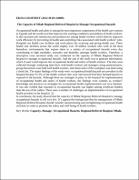| dc.contributor.author | Ekisa, Geoffrey | |
| dc.date.accessioned | 2018-10-29T17:21:06Z | |
| dc.date.available | 2018-10-29T17:21:06Z | |
| dc.date.issued | 2012 | |
| dc.identifier.citation | Ekisa, G. (2012). The Capacity of Mbale Regional Referral Hospital to Manage Occupational Hazards. Uganda Martyrs University, Nkozi: Uganda Martyrs University. | en_US |
| dc.identifier.uri | http://hdl.handle.net/20.500.12280/747 | |
| dc.description.abstract | EKISA GEOFFREY (2012-M191-10009)
The Capacity of Mbale Regional Referral Hospital to Manage Occupational Hazards
Occupational health and safety is among the most important components of the health care systems in Uganda and the world over that improves the working conditions and abilities of health workers. It also increases job satisfaction and productivity among health workers which directly improves work efficiency by preventing ill health and controlling risks associated with health workers‟ jobs. Hospitals are health care facilities and work places for receiving and giving health care. These health care facilities across the world employ over 59 million workers who work in the most hazardous environments that expose them to a variety of occupational hazards every day contributing to high morbidity, mortality and disability amongst health workers. Therefore, a descriptive cross sectional study was conducted on the capacity of Mbale Regional Referral hospital to manage occupational hazards. And the aim of the study was to generate information, which if used could improve the occupational health and safety of health workers. The data were collected through conducting interviews with health workers and managers using questionnaires, group discussions were held with health workers, and observation of the workplace was done using a check list. The major findings of the study were: occupational health hazards are prevalent in the hospital because 91.3% of the health workers that were interviewed had been harmed/injured or exposed to the hazards. Although there are strategies in place in the hospital for implementation of occupational health and safety of health workers, the findings were contrary as workers‟ knowledge and practices on strategies for occupational health implementation was very minimal. It was also evident that exposure to occupational hazards was higher among certificate holders than the rest of the cadres. There were a number of challenges on implementation of occupational health activities in the hospital. 22
In conclusion, the study showed that the capacity of Mbale Regional Referral Hospital to manage occupational hazards is still very low. It‟s against this background that the management of Mbale Regional Referral Hospital should consider mainstreaming and strengthening occupational health activities in order to promote the safety and well-being of health workers.
Key Words: . | en_US |
| dc.language.iso | en | en_US |
| dc.publisher | Uganda Martyrs University | en_US |
| dc.subject | Capacity | en_US |
| dc.subject | Manage | en_US |
| dc.subject | Occupational Hazards | en_US |
| dc.subject | Regional Referral Hospital | en_US |
| dc.subject | Mbale | en_US |
| dc.title | The Capacity of Mbale Regional Referral Hospital to Manage Occupational Hazards | en_US |
| dc.type | Thesis | en_US |


